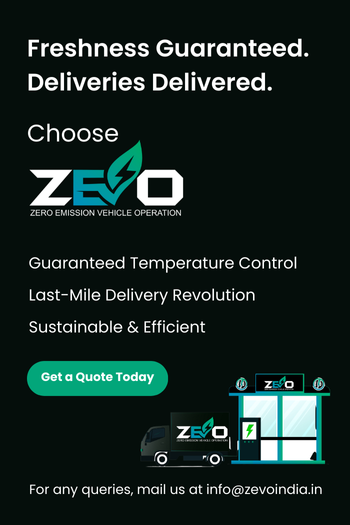The Benefits of Refrigerated Last-Mile Delivery for Groceries

Akshay Sharma
CEO's Office @ZEVO
The grocery industry in India is experiencing a rapid online boom. According to IBEF, the Indian e-commerce industry, which includes groceries, is projected to reach a whopping US$ 300 billion by 2030.
This translates to a significant growth rate, with a milestone of US$ 60 billion achieved in fiscal year 2023, marking a 22% increase from the previous year [IBEF]. Consumers are increasingly embracing the convenience of online grocery shopping, with deliveries arriving directly at their homes.
However, a crucial challenge arises in the final stage of this process – last-mile delivery. While traditional methods efficiently transport most items, they often lack the necessary infrastructure for temperature-sensitive groceries.
This includes essentials like meat, dairy products, and delicate fruits and vegetables, all of which require specific temperature control to ensure freshness and safety.
[Source]
The Need for Refrigerated Last-Mile Delivery
As highlighted earlier, the online grocery market in India is experiencing explosive growth. As per IBEF, the market is expected to reach a staggering US$ 300 billion by 2030. This surge in online grocery shopping brings immense convenience, but it also exposes a critical vulnerability: the spoilage of temperature-sensitive groceries.
The problem lies in the very nature of our grocery baskets. Not all items are created equal. While pantry staples like pasta and canned goods can withstand ambient temperatures, a significant portion of our grocery haul requires specific temperature control.
This includes essentials like meat, dairy, and delicate fruits and vegetables, all of which thrive in specific temperature ranges to ensure freshness and safety. We’re also increasingly opting for prepared meals and pre-cut fruits, which often contain ingredients requiring consistent cool temperatures to maintain quality and prevent spoilage.
The consequences of spoilage extend far beyond a wasted meal. Food waste is a significant global issue, and inadequate temperature control during delivery contributes to this problem.
Spoiled groceries lead to customer dissatisfaction, with frustrated shoppers less likely to return for repeat business. Furthermore, businesses incur lost revenue due to discarded products and potential refunds. Clearly, a solution is needed to ensure the safe and fresh delivery of temperature-sensitive groceries.
Grocery Products Requiring Temperature Control
As we’ve established, not all groceries are happy sitting at room temperature. To ensure the quality and safety of these perishable items, temperature-controlled transportation is crucial during last-mile delivery. Here’s a breakdown of common grocery categories that require specific temperature ranges:
Note: This table provides a general guideline. Some fruits and vegetables have specific requirements. For example, tropical fruits like bananas and mangoes prefer slightly warmer temperatures (around 13°C – 18°C). It’s always wise to check the individual product label for specific storage recommendations.
Solutions: Refrigerated Last-Mile Delivery Vehicles
The answer to ensuring the safe and fresh arrival of our temperature-sensitive groceries lies in refrigerated last-mile delivery vehicles. These specialized vehicles address the critical issue of spoilage by maintaining consistent cool temperatures throughout the delivery journey.
Here’s how these innovative vehicles come to the rescue:
- Consistent Temperature Control: Refrigerated last-mile vehicles are equipped with powerful cooling units that maintain a pre-set temperature range throughout the delivery process. This ensures that meat, dairy, produce, and prepared meals remain within their ideal temperature zones, inhibiting bacterial growth and preserving freshness.
- Variety of Vehicle Types: Depending on the delivery needs, different types of refrigerated vehicles can be utilized:
- Vans with Built-in Refrigeration Units: Compact and maneuverable, these vans are ideal for urban deliveries. Popular examples include the Ford Transit Connect and Mercedes-Benz Sprinter with integrated refrigeration units by companies like Thermo King and Carrier.
- Compartmentalized Trucks: For larger deliveries, compartmentalized trucks offer a versatile solution. Leading manufacturers like Isuzu and Hino offer various models with multi-temperature compartments, like the Isuzu NPR series and Hino Dutro.
- Three-Wheeled Delivery Scooters: In densely populated areas or for short-distance deliveries, three-wheeled refrigerated scooters offer a unique advantage. Companies like Piaggio and Altigreen are developing innovative models like the Piaggio Ape and Altigreen Triggo with integrated refrigeration systems.
- Cargo Cycles with Refrigeration Units: Another sustainable option for short-distance deliveries are cargo cycles equipped with refrigeration units. Companies like Icicle Tricycles and Urban Cargo offer pedal-assisted models like the Icicle Trike with Cool Cube and the Urban Cargo YXZ with Carrier Refrigeration.
- Refrigerated Walk-in Trucks: For large-scale grocery distribution centers or high-volume deliveries, refrigerated walk-in trucks provide significant cargo capacity. Popular choices include the Freightliner Cascadia and Volvo VNR equipped with refrigerated trailers from brands like Wabash and Schmitz.
- Refrigerated Delivery Drones: While still under development, refrigerated delivery drones hold promise for the future of last-mile delivery. Companies like Alphabet’s Wing and Amazon Prime Air are pioneering drone technology with temperature-controlled capabilities.
- Vans with Built-in Refrigeration Units: Compact and maneuverable, these vans are ideal for urban deliveries. Popular examples include the Ford Transit Connect and Mercedes-Benz Sprinter with integrated refrigeration units by companies like Thermo King and Carrier.
By employing these specialized vehicles, last-mile delivery companies can create a seamless cold chain, ensuring that temperature-sensitive groceries reach customers in the same pristine condition they left the store. This not only minimizes food waste but also enhances customer satisfaction and overall business efficiency.
Electric Refrigerated Vehicles: Delivering Fresh Groceries & a Sustainable Future
Traditional delivery vehicles leave a dirty footprint. But fear not, eco-conscious grocery shoppers! Electric Vehicles (EVs) with refrigeration units are here to revolutionize last-mile delivery.
Here’s why EVs are the future of fresh groceries:
- Clean Air: Unlike gas guzzlers, EVs boast zero tailpipe emissions, reducing air pollution in cities (think cleaner air, easier breathing).
- Climate Warriors: EVs fight climate change by eliminating harmful emissions that contribute to global warming.
- Peace & Quiet: Quieter operation means less noise pollution, creating a calmer environment in bustling urban areas.
- Cost Savings Potential: Lower long-term costs due to reduced dependence on fuel prices and potentially lower maintenance. Imagine savings on both groceries and delivery!
With advancing battery tech and a growing charging network, expect to see more EV refrigerated vehicles on the road soon. This means fresh groceries delivered in a way that benefits both your table and the planet.
Conclusion:
Fresh groceries on demand shouldn’t cost the Earth. Refrigerated last-mile delivery keeps food fresh, reducing waste. And the future looks bright with the rise of electric refrigerated vehicles. These eco-friendly rides deliver groceries while promoting cleaner air, quieter streets, and a healthier planet.
The final thought? Support businesses embracing sustainable practices like EV deliveries. Together, we can ensure a future where convenience meets responsibility, delivering fresh groceries for our tables and a greener future for all.

Share this Article
Subscribe to our newsletter
Be the first to receive exclusive offers and the latest news on our products and services directly in your inbox.
